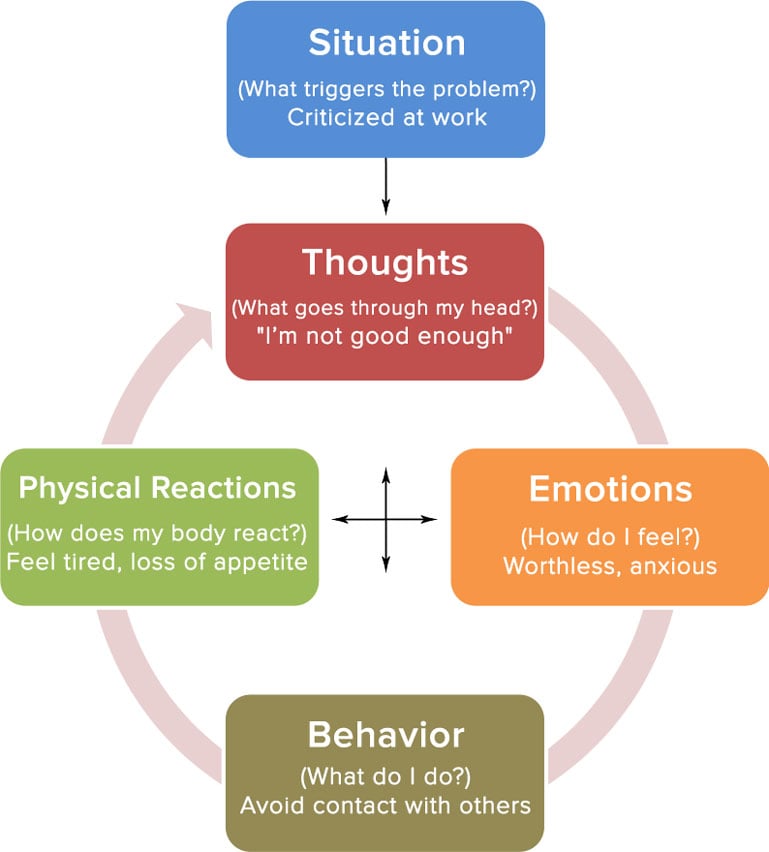CBT Therapy | Anti-Heartbreak Pills | Section 1
The definition of CBT
Cognitive: A term describing your thoughts and anything to do with the mind’s function, such as dreams, images, etc.
Behavioral: Refers to how we respond to situations, including the things we do and also the things we don’t do.
Therapy: This is the process that you’re going through now. As you can see, it’s nothing like the dramatized leather couch. Therapy can include self-therapy, group therapy or therapy with a doctor.
The basics of CBT
CBT describes several therapies that all have a similar approach to solving problems. They can range from anxiety or depression to insomnia or relationship problems. CBT is a combination of cognitive and behavioral therapy that focuses on the thoughts, images, beliefs and attitudes that we hold (our cognitive processes) and how they relate to the way we behave, as a way of dealing with emotional problems.
You will learn that CBT is a form of therapy that involves looking at your thoughts, behaviors and emotions, which are all interconnected. You'll learn the basic insight that it’s what you think that affects how you behave and how you feel, not external stimuli like people or events. We show you that worksheets, your activity plan and your journal are all important parts of your work towards overcoming your problem, whatever it might be.

CBT is based on the idea that your thoughts are what cause your feelings and behaviors, not external stimuli like people, situations and events. It’s not the stimulus itself that directly creates an emotional response. It is your evaluation of your thought about that stimulus. The benefit of this insight is that you can change the way you think, so that you feel and act better, even if the situation hasn’t changed. As shown in the figure, there is a cycle of consequences with everything that you do. This plays a major part in your overall feelings, which, in turn, affects your anxiety.
How CBT will help you
-
CBT HELPS YOU TO IDENTIFY AND CHALLENGE YOUR SPECIFIC PROBLEMS
CBT is a problem specific and pragmatic approach, because it helps you to identify your specific problems and then provides tools, so that you can work with them. CBT differs from other therapies, because the sections have a structure, rather than the person talking/thinking freely about whatever comes to mind. In the next section, you will identify your specific problems that contribute to making you feel unhappy, and set up goals to work towards. The problems may be troublesome symptoms, such as sleeping badly, not being able to socialize with friends or difficulty concentrating on reading or work. They could also be life problems, such as being unhappy at work, having trouble dealing with an adolescent child or being in an unhappy marriage.
-
CBT TEACHES YOU TO THINK IN A DIFFERENT WAY
CBT is particularly well-developed and empirically supported (research supported). This is important when clients frequently experience excessively negative thoughts which arise automatically, even in response to stimuli which might otherwise be experienced as positive. CBT helps you to understand the importance of thinking and how it affects how you feel and what you do. It is one of the core fundamentals of this online therapy program. It will help you to work on your problems and to become happier. CBT will teach you skills for dealing with your problems. This includes learning to record your thoughts and to look at them more realistically. You will do this in your journal. It will help you to break the downward spiral of your negative mood.
-
CBT HELPS YOU TO UNLEARN UNWANTED REACTIONS
CBT is based on the scientifically supported assumption that most emotional and behavioral reactions are learned. Therefore, the goal of therapy is to help you unlearn your unwanted reactions and to learn a new way of reacting. The educational emphasis of CBT has an additional benefit, in that it leads to long-term results. When people understand how and why they are doing well, they know what to do to continue doing so.
-
CBT SUPPORTS YOU WITH HANDS ON TOOLS
Filling in your worksheets, using your activity plan and keeping a journal are very important parts of CBT. If you thoroughly complete all these assignments, we guarantee that you will make the most of this online therapy experience and get the best results. These tools will make you look at and think about problems and situations in a different way. It will become completely clear in the future sections what is demanded of you.
